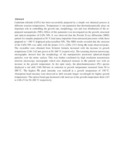| dc.contributor.author | Kiprotich, Sharon | |
| dc.contributor.author | Onani, M. O. | |
| dc.contributor.author | Dejene, B. F. | |
| dc.date.accessioned | 2021-04-29T14:43:15Z | |
| dc.date.available | 2021-04-29T14:43:15Z | |
| dc.date.issued | 2018-01 | |
| dc.identifier.citation | Journal of Materials Science: Materials in Electronics volume 29, pages6004–6011(2018) | en_US |
| dc.identifier.uri | https://repository.uwc.ac.za/handle/10566/3407 | |
| dc.identifier.uri | https://link.springer.com/article/10.1007/s10854-018-8574-6 | |
| dc.identifier.uri | https://www.researchgate.net/publication/322508038_Effect_of_growth_temperature_on_the_structural_optical_and_luminescence_properties_of_cadmium_telluride_nanoparticles | |
| dc.identifier.uri | https://www.x-mol.com/paper/1335504738212868274?recommendPaper=5747136 | |
| dc.identifier.uri | http://hdl.handle.net/123456789/4628 | |
| dc.identifier.uri | http://dx.doi.org/10.1007/s10854-018-8574-6 | |
| dc.description.abstract | Cadmium telluride (CdTe) has been successfully prepared by a simple wet chemical process at different reaction temperatures. Temperature is one parameter that thermodynamically plays an important role in controlling the growth rate, morphology, size and size distribution of the as-prepared nanoparticles (NPs). Effect of this parameter was investigated on the growth, structural and optical properties of CdTe NPs. It was observed that the Powder X-ray diffraction (XRD) pattern for samples prepared at 50 °C had many impurities from unreacted precursors while those prepared at > 100 °C displayed polycrystalline NPs. The XRD results revealed that the structure of the CdTe NPs was cubic with the planes (111), (220), (311) being the main observed peaks. The crystallite sizes obtained from Scherrer formula increased with the increase in growth temperature (2.86–3.62 nm grown at 50–200 °C respectively). The scanning electron microscopy micrographs showed that the morphology of the nanoparticles possessed spherical-shaped particles over the entire surface. This was further confirmed by high resolution transmission electron microscopy micrographs which also displayed increase in the particle size with an increase in the growth temperature. In the optic study, the photoluminescence (PL) spectra displayed a red shift (540–560 nm) in emission as growth temperature increased from 50 to 200 °C. The highest PL peak intensity was realized at a growth temperature of 150 °C. Absorption band maxima were observed to shift towards longer wavelength for higher growth temperatures. The optical band gap decreased with increase in the growth temperature from 2.67 to 2.08 eV for 50–200 °C respectively. | en_US |
| dc.language.iso | en | en_US |
| dc.title | Effect of growth temperature on the structural, optical and luminescence properties of cadmium telluride nanoparticles | en_US |
| dc.type | Article | en_US |

